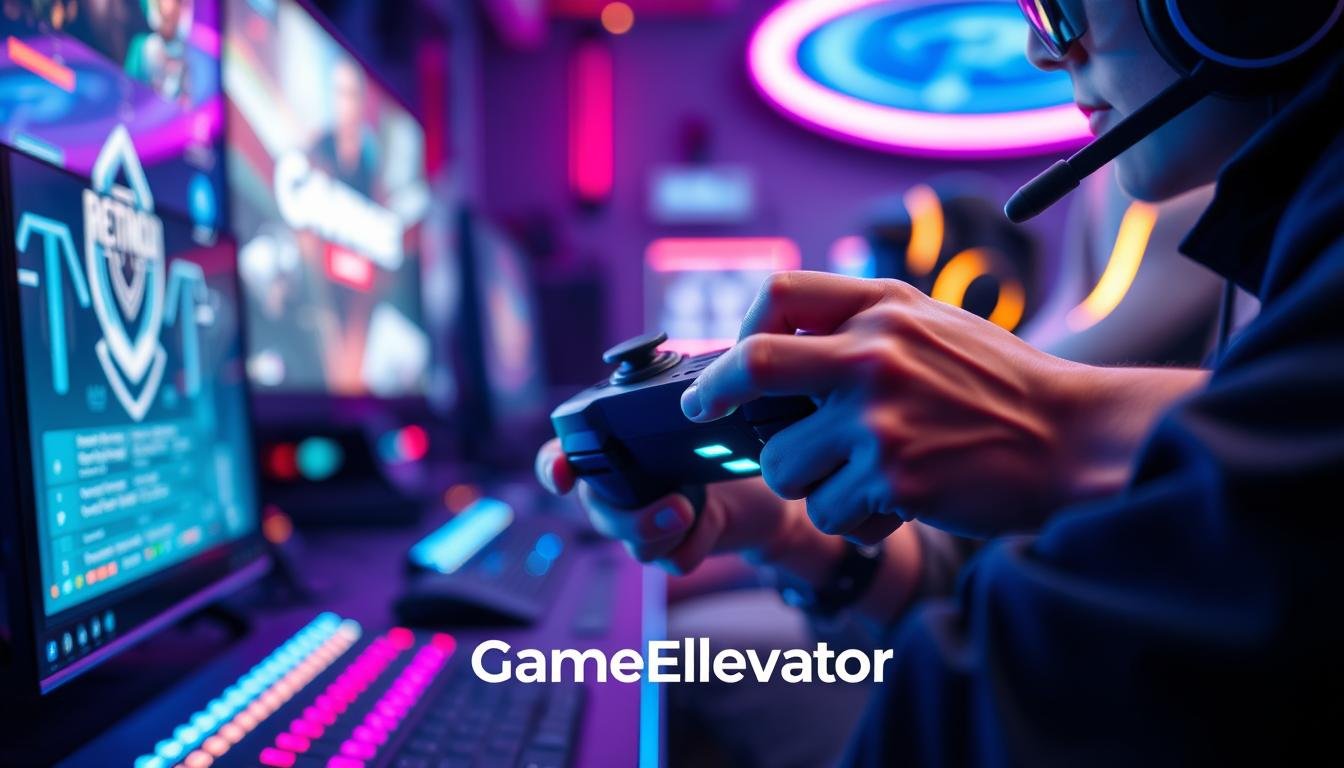Did you know top esports players react faster than pro race car drivers? With competitive gaming on the rise, quick reflexes are key for any player. This guide on improving game reflexes will share expert tips and strategies to boost your reaction time, hand-eye coordination, and help you get ahead in your favorite games.
Key Takeaways
- Understand the importance of quick reaction time in gaming performance
- Discover cognitive enhancement techniques to improve visual processing speed
- Learn hand-eye coordination drills to sharpen your gaming reflexes
- Explore neurotracker exercises that leverage brain plasticity
- Implement attention focus techniques to enhance your in-game awareness
Understanding Gaming Reflexes
In competitive gaming, a split-second can change everything. This is where gaming reflexes play a key role. They help gamers quickly react to in-game events, making crucial decisions fast.
What Are Gaming Reflexes?
Gaming reflexes combine physical and mental skills. These include hand-eye coordination, visual processing speed, and reaction time. Together, they help gamers spot threats, plan, and act fast and accurately.
The Importance of Quick Reaction Time
In fast-paced games, reaction time is vital. Gamers with quick reflexes can act before others, giving them an edge. Improving this skill can be the difference between winning and losing.
Understanding gaming reflexes and reaction time helps gamers improve. By focusing on these areas, they can enhance their performance and reach new heights in gaming.
“The difference between a good gamer and a great gamer often comes down to their ability to react and respond quickly to in-game situations.”
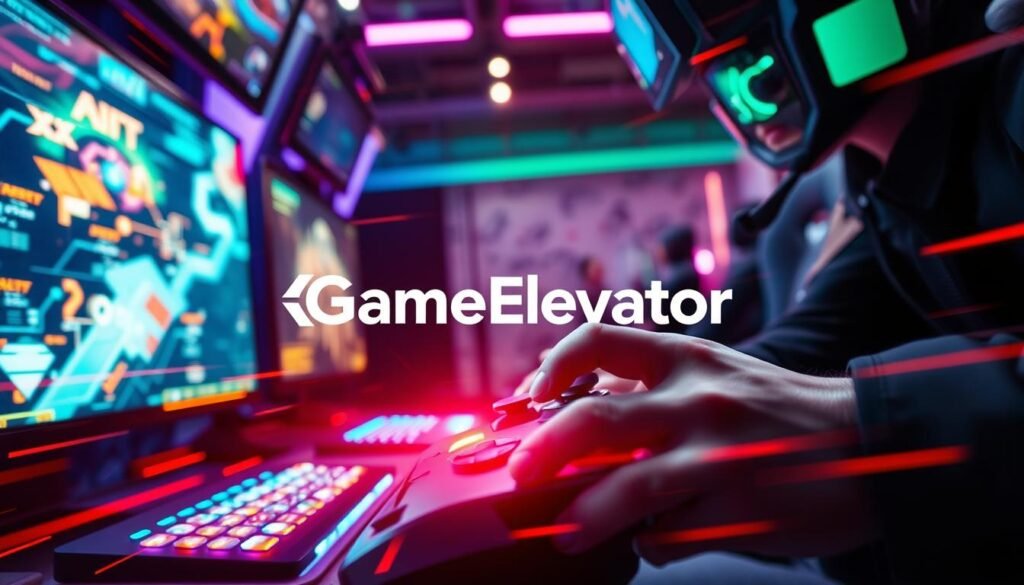
As we dive into gaming reflexes, we’ll look at ways to improve. From brain training to hand-eye drills, the journey to better reflexes requires dedication and practice.
Improving game reflexes
Getting better at gaming reflexes is key to winning more. You can train your mind and body to react faster. This helps you guess what your opponents will do and make quick decisions.
Brain training exercises are a great way to boost your reflexes. These activities, like speed drills and visual tasks, sharpen your mind. Doing them often can really improve how well you play.
It’s also important to work on your hand-eye coordination. Drills that test your quickness and accuracy can make you better at complex moves. This lets you play more smoothly.
| Reflex Development Strategies | Key Benefits |
|---|---|
| Brain Training Exercises | Improved cognitive abilities and reaction time |
| Hand-Eye Coordination Drills | Enhanced dexterity and decision-making skills |
| Reaction Time Training | Faster response times and better anticipation of opponents’ actions |
Using these strategies can really help you get better at gaming reflexes. Remember, it takes practice and dedication to become a pro at gaming reflexes.

“The true test of a champion is not whether he can triumph, but whether he can overcome obstacles.” – Garry Kasparov
Brain Training Exercises
Brain training exercises can greatly improve your gaming skills. We’ll look at ways to boost your brain and quicken your reactions to in-game events.
Cognitive Enhancement Techniques
Here are some exercises to enhance your brain:
- Memory exercises, like memorizing sequences, can help you remember important game info.
- Drills like the Stroop test improve your focus, making you more responsive.
- Brain teasers and puzzles sharpen your problem-solving skills, leading to quicker in-game decisions.
Visual Processing Speed Drills
Improving your visual processing speed is key for quick reactions. Try these drills:
- Tachistoscopic training exposes you to visual cues briefly, then asks you to recall them.
- Exercises that track multiple moving objects at once expand your field of view and spatial awareness.
- Reaction time tests, where you quickly respond to visual cues, sharpen your reflexes.
Combining these techniques and drills will help you reach your full gaming potential.
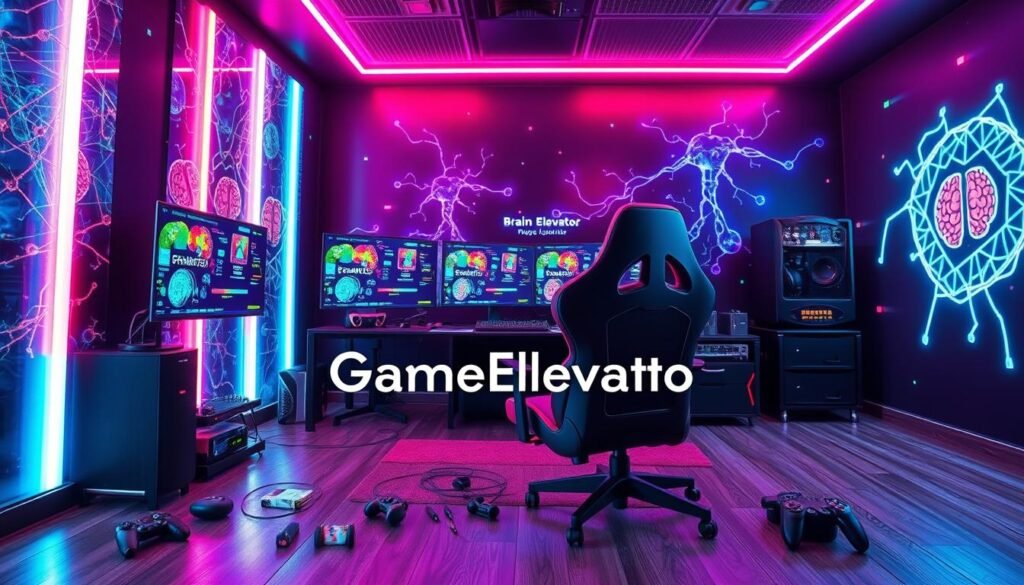
| Technique | Description | Benefits |
|---|---|---|
| Memory Exercises | Memorizing sequences, patterns, and information | Improved recall and information retention during gameplay |
| Attention-Focusing Drills | Exercises like the Stroop test to enhance focus | Sharper attention and better responsiveness to in-game events |
| Brain Teasers and Puzzles | Challenging problem-solving activities | Quicker decision-making and improved analytical skills |
| Tachistoscopic Training | Brief exposure to visual stimuli and recalling details | Enhanced visual processing speed and reaction time |
| Peripheral Vision Exercises | Tracking multiple moving objects simultaneously | Expanded field of view and improved spatial awareness |
| Reaction Time Tests | Responding to visual cues as quickly as possible | Honed reflexes and faster reaction times |
“Improving your visual processing speed and attention focus can give you a significant edge in high-intensity gaming situations.”
Hand-Eye Coordination Drills
Improving your hand-eye coordination is key for better gaming reflexes. We’ll show you drills and exercises to boost your quick, precise movements. These are essential for success in fast-paced video games.
The ball catch drill is a classic for hand-eye coordination. Stand a few feet from a wall and toss a small ball or object against it. Catch it as it bounces back. Increase the toss distance and speed to make it harder.
Try the reaction time test for another drill. Set up lights or targets and have someone randomly turn them on. Your task is to touch the target as soon as it lights up. This improves your visual speed and reflexes.
- Try hand-eye coordination drills like the cup and ball game, where you have to keep track of a small ball as it moves under a series of cups.
- Incorporate tracking exercises, such as following a moving object with your eyes and hands, to hone your ability to anticipate and react to rapidly changing visual cues.
- Engage in reflex-based video games or training apps that challenge your hand-eye coordination and reaction time.
Consistent practice is crucial for mastering these drills and unlocking your gaming potential. Keep at it, and you’ll see your reflexes and in-game performance improve.
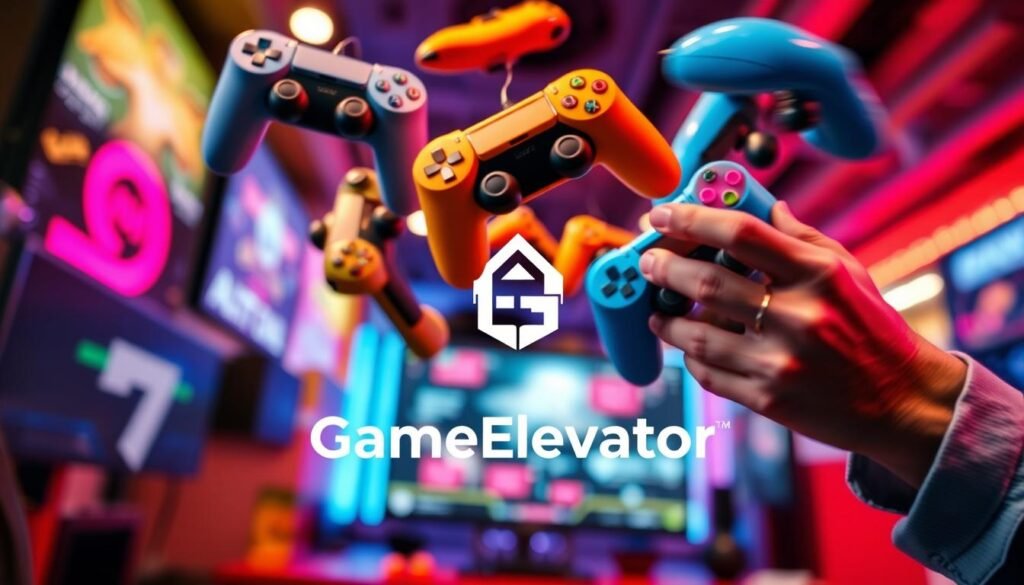
Reaction Time Training
To improve your gaming reflexes, you need more than just playing games. You should also do reaction time training regularly. These exercises boost your senses and motor skills. This helps you react quickly in fast games.
Sensory Stimulation Games
Sensory stimulation games are great for reaction time training. They use different sights, sounds, and touches to challenge you. This makes your brain faster and more accurate.
- Visual reaction time games that require you to identify and respond to flashing lights or moving objects
- Auditory reaction time games that challenge you to detect and react to specific sounds
- Tactile reaction time games that test your ability to perceive and respond to physical touch or vibrations
Playing a variety of sensory stimulation games improves your reflexes. This is key for success in many games.
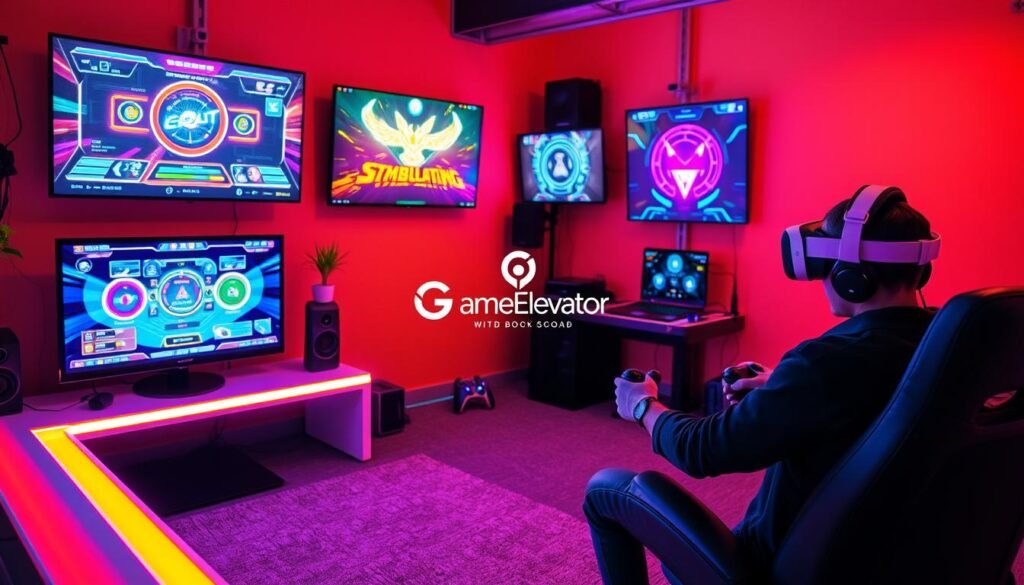
“Mastering reaction time is the key to unlocking your full potential as a competitive gamer. With regular practice, you can train your brain to process information and respond with lightning-fast precision.”
Neurotracker Exercises
In the world of gaming, using your brain’s ability to adapt is crucial. Neurotracker is a game-changer that uses the brain’s flexibility to boost your gaming skills. It helps improve your reflexes and thinking.
Neurotracker workouts aim to sharpen your visual speed, focus, and quick decision-making. These skills are vital for fast reactions and making quick choices in games. By doing these brain workouts, you can reach new heights in your gaming abilities.
Leveraging Brain Plasticity for Reflex Mastery
The human brain is amazing, always changing and adapting to new things. This ability, called brain plasticity, is what neurotracker exercises are based on. These exercises help make your brain better at quick thinking, decision-making, and moving fast.
With neurotracker training, you’ll get better at tracking fast-moving targets and predicting your opponents’ moves. You’ll also get faster and more precise in your actions. The secret is to keep challenging your brain and using its flexibility to your advantage.
![]()
Unlock your mind’s full potential and boost your gaming skills with neurotracker exercises. They use the brain’s amazing brain plasticity to improve your thinking and outdo your rivals. This technology is a game-changer for anyone looking to excel in gaming.
Attention Focus Techniques
Keeping your attention focus sharp is key for better gaming skills. We’ll share effective ways to boost your focus. This will help you react faster to the action on your screen.
Brain training, like sudoku and chess, can enhance your cognitive enhancement. These activities improve your visual speed and problem-solving. They sharpen your concentration.
Regular exercise is also great for focus. Research shows a 20-minute workout can boost your focus and attention.
“Spending time in nature has been proven to reduce mental fatigue and improve concentration levels. Step away from the screen and immerse yourself in a serene natural setting to recharge and refocus your mind.”
Mindfulness, like meditation, can change the game for your cognitive enhancement. It trains your mind to stay present and focused. This helps you keep your attention during long gaming sessions.
Don’t forget to take breaks to keep your focus sharp. If you start to lose focus, take a break. Stretch and let your mind rest.
By using these focus techniques in your gaming, you’ll improve fast. You’ll be ready to dominate the competition.
Reflex Development Strategies
Strong gaming reflexes are key to success online. To reach your best, we need to look at practical ways to improve. By adding these strategies to your daily play, you can enhance your reflexes and improve your game.
Incorporating Reflex Training into Your Routine
Regular practice is vital for reflex improvement. Set aside time for specific training exercises. Doing these before you play can get your reflexes ready for action.
- Try reaction time drills to quickly respond to signals.
- Do hand-eye coordination exercises to improve your skills.
- Play brain-training games to boost your thinking and decision-making.
Being consistent is important. Just 15-20 minutes a day can make a big difference in your game.
“Mastering your gaming reflexes is a journey, not a destination. With dedication and the right strategies, you can unlock your full potential and dominate the virtual battlefield.”
Adding reflex training to your routine improves your skills and awareness. These are crucial for any serious gamer.
Nutrition and Lifestyle Factors
Improving your gaming skills is more than just quick reflexes. Your health and well-being greatly affect your brain power and gaming skills. By focusing on nutrition and lifestyle factors, you can enhance your cognitive enhancement and excel in gaming.
Good nutrition is key. Eating foods rich in vitamins, minerals, and antioxidants boosts brain function. Include leafy greens, berries, fatty fish, and whole grains in your diet. Also, drink plenty of water and avoid processed foods and sugary snacks to stay sharp.
Lifestyle factors are also vital. Regular exercise improves memory, attention, and speed, all important for gaming. Getting enough sleep is crucial too, as lack of sleep harms your brain and reaction time.
By adding these nutrition and lifestyle habits to your gaming routine, you’ll see real improvements. Taking care of your body and mind unlocks your cognitive enhancement and boosts your gaming skills.
“A healthy body supports a healthy mind, and that’s the key to gaming excellence.”
Gaming Peripheral Considerations
The right gaming peripherals and setup can greatly improve your gaming reflexes. By choosing and setting up your gaming equipment wisely, you can boost your hand-eye coordination and reaction time. This gives you an edge in your favorite games.
Optimizing Your Gaming Setup
Your gaming setup is key to your performance, not just how it looks. Here are some tips to make your setup better for reflexes:
- Get a high-quality gaming mouse with a fast sensor and adjustable DPI. This lets you adjust the cursor sensitivity to your liking.
- Invest in a mechanical keyboard with low latency and customizable key switches. The feedback and quick response can improve your typing and in-game actions.
- Use a wide, high-refresh-rate gaming monitor for smooth, lag-free visuals. This helps your eyes track movements better.
- Make sure your setup is ergonomic. Your chair, desk, and monitor should be at the right height and distance. This reduces fatigue and supports better hand-eye coordination.
Remember, the goal is to create a gaming environment that minimizes distractions and encourages focus. This lets you fully immerse yourself in the game and improve your reflexes.
“The right gaming setup can make a world of difference in your performance. By optimizing your equipment and environment, you can unlock your full potential and dominate the competition.”
Mindset and Mental Preparation
Having the right mindset and mental preparation can greatly improve your gaming skills. As gamers, we know how crucial it is to stay focused, confident, and resilient. This helps us perform better in games.
To build a winning mindset, try these tips before you play:
- Do attention focus exercises to improve your concentration and ignore distractions.
- Imagine yourself succeeding and making quick, smooth moves in the game.
- Use positive self-talk to boost your confidence and overcome doubts.
- Believe in a growth mindset, knowing your reflexes can get better with practice.
Also, use mental preparation to get ready for each game. Try these:
- Do deep breathing to calm down and focus.
- Practice mindfulness meditation to stay present.
- Repeat affirmations to strengthen your confidence and dedication to excellence.
By using these mindset and mental preparation tips, you’ll become mentally strong. This will help you reach your full gaming potential. Remember, your mind is a powerful tool. Use it well, and your reflexes will improve dramatically.
“The mind is the limit. As long as the mind can envision the fact that you can do something, you can do it, as long as you really believe 100 percent.” – Arnold Schwarzenegger
Age and Gaming Reflexes
Age can sometimes affect our gaming reflexes, but it’s not a total block. As we get older, our brain’s brain plasticity might decrease. Yet, with the right training and strategies, we can keep up our gaming skills, even as we age.
It’s important to note that age-related changes in gaming reflexes are not uniform. Some people might see a bigger drop, while others can keep their reflexes sharp well into old age. This difference comes from a mix of genetics, lifestyle, and environment.
To fight off the decline in gaming reflexes, we need to do brain training exercises and sensory games. These activities can boost our brain’s abilities, like reaction time and decision-making. These skills are key for winning in competitive gaming.
| Age Range | Typical Gaming Reflex Changes |
|---|---|
| 18-25 years | Peak performance in gaming reflexes |
| 26-35 years | Gradual decline in gaming reflexes, but still high performance |
| 36-45 years | More noticeable decline in gaming reflexes, but can be mitigated with targeted training |
| 46-55 years | Significant decline in gaming reflexes, but can be improved with consistent practice and lifestyle modifications |
| 56+ years | Substantial decline in gaming reflexes, but not insurmountable with a dedicated approach to brain-boosting activities |
Remember, age is just a number. With the right mindset, training, and lifestyle, we can keep our gaming reflexes sharp, no matter our age. By understanding how age, gaming reflexes, and brain plasticity connect, we can adjust our approach and keep excelling in competitive gaming.
“With the right mindset and strategies, age doesn’t have to be a barrier to gaming excellence.”
Mastering Winning Gameplay Techniques for Success
Conclusion
In this guide, we’ve shared many expert tips to help you improve your game reflexes. We looked into the science behind gaming reflexes and the need for quick reactions. We also covered exercises and training methods to help you reach your best.
We talked about brain-training, hand-eye coordination, and reaction time training. We also discussed how nutrition, lifestyle, and gaming gear can boost your performance. Age and a positive mindset play big roles too.
Now, it’s time to put what you’ve learned into action. Use the key takeaways from this article in your daily routine. Stay committed to your training and see how it changes your gaming skills. With hard work and a drive to get better, you’ll master even the toughest video game challenges.

